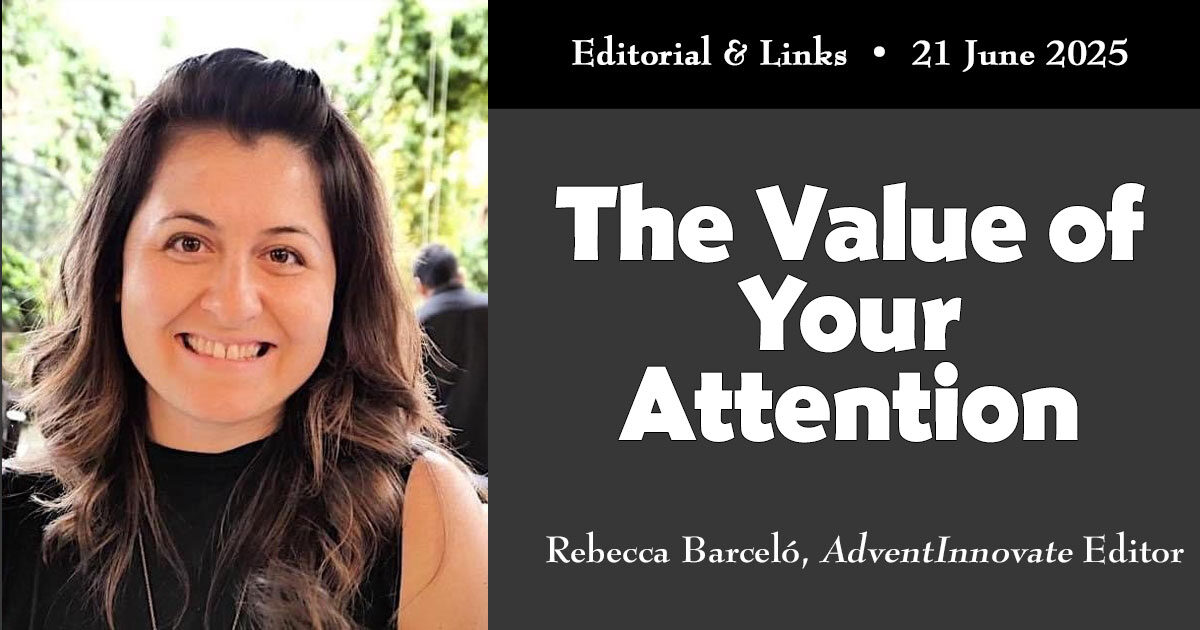Editorial: “The Value of Your Attention”
“Not only does hurry keep us from the love, joy, and peace of the kingdom of God—the very core of what all human beings crave—but it also keeps us from God himself simply by stealing our attention. And with hurry, we always lose more than we gain.” — John Mark Comer, The Ruthless Elimination of Hurry
John Mark Comer’s insight on hurry reveals something deeper than a mere scheduling problem—it’s a spiritual crisis. Hurry doesn’t just exhaust our bodies; it fractures our souls. But what if we substituted the word “hurry” in his quote with “news” or “television” or “social media” or even “productivity”? Suddenly, we’re not just talking about a calendar issue—we’re talking about the modern epidemic of fragmented attention. These constant stimuli are no longer occasional distractions; they are now baked into our daily rhythms, vying for the very focus that once belonged to contemplation, relationships, prayer, and deep thought.
In today’s economy, attention has become the most valuable—and most exploited—commodity. Tech companies don’t just want our money; they want our time, our gaze, our habits. The longer we stay on a platform or streaming service, the more profit they make. So, they engineer experiences to hijack our attention. But unlike money, which we can earn again, attention—once spent—is gone. We only get so many hours in a day, and the way we spend those hours ultimately shapes the people we become. The real cost of attention isn’t just lost productivity—it’s the slow erosion of our inner lives.
We often think we’re consuming media, but much of the time, it’s consuming us. News cycles stir anxiety. Endless scrolling breeds envy or numbness. Streaming marathons fill the silence that might otherwise invite reflection or prayer. And while none of these things are inherently evil, their dominance in our lives slowly rewires what we desire and how we relate to others—and to God. Comer warns that hurry keeps us from love, joy, and peace, but so does any unchecked addiction to stimulation. We were not made to be this distracted.
The irony is that what we truly crave—meaning, connection, clarity, peace—can’t be delivered through a screen or fed through a newsfeed. Those things require slowness, presence, and margin. Attention is the doorway to all of them.
To reclaim our attention, then, is to reclaim our lives. It’s not simply about being more efficient or productive; it’s about becoming more human again. Choosing where to place our attention is, in many ways, a spiritual act—an act of resistance against the forces that monetize our minds. It’s not easy. It will require new habits and intentional choices. But as Comer says, with attention (like with hurry), we always lose more than we gain unless we steward it well. And in stewarding it, we open ourselves again to the love, joy, and peace that come only from being fully present—with God, with others, and with ourselves.
Rebecca Barcelo
Media Editor, Adventist Today
21 June 2024
ANNOUNCEMENTS & LINKS
Today’s ATSS class (1:30 PM Eastern US) with Tammy Wiese
One-click link: https://us06web.zoom.us/j/89630203449
Passcode: CROSS {ALL CAPS}
Previous weeks’ ATSS recordings can be accessed here.
Join our Weekly Update mailing list here.
Our donation page can be accessed here.




